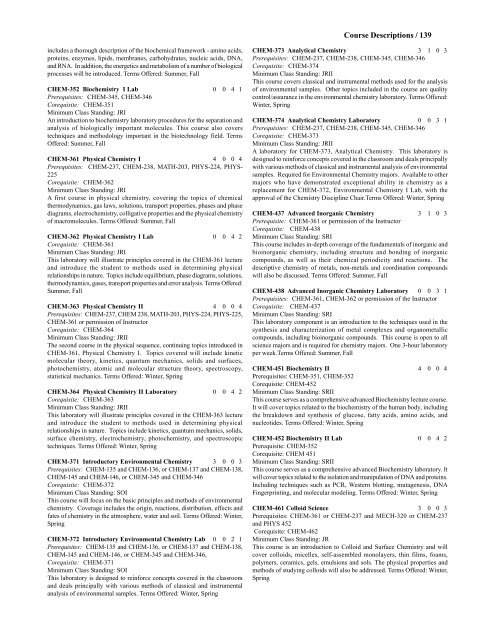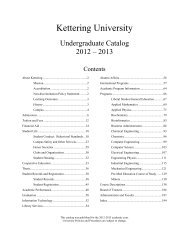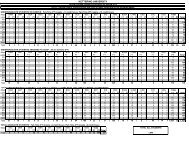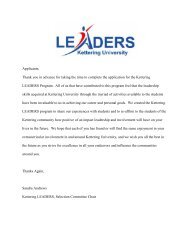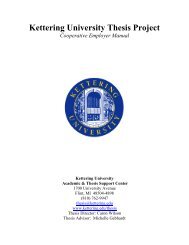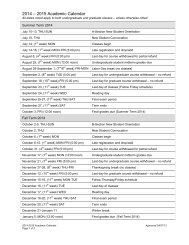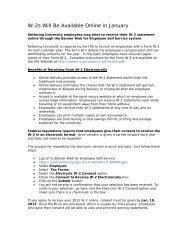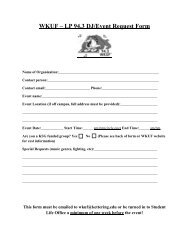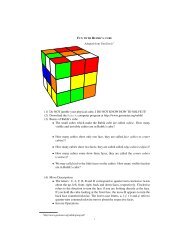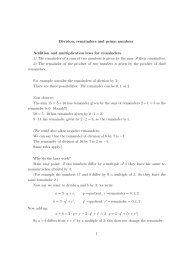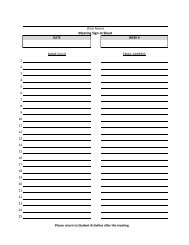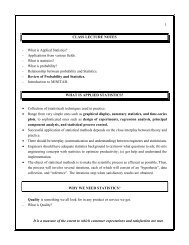2007-2008 Undergraduate Catalog - Kettering University
2007-2008 Undergraduate Catalog - Kettering University
2007-2008 Undergraduate Catalog - Kettering University
You also want an ePaper? Increase the reach of your titles
YUMPU automatically turns print PDFs into web optimized ePapers that Google loves.
Course Descriptions / 139<br />
includes a thorough description of the biochemical framework - amino acids,<br />
proteins, enzymes, lipids, membranes, carbohydrates, nucleic acids, DNA,<br />
and RNA. In addition, the energetics and metabolism of a number of biological<br />
processes will be introduced. Terms Offered: Summer, Fall<br />
CHEM-352 Biochemistry I Lab 0 0 4 1<br />
Prerequisites: CHEM-345, CHEM-346<br />
Corequisite: CHEM-351<br />
Minimum Class Standing: JRI<br />
An introduction to biochemistry laboratory procedures for the separation and<br />
analysis of biologically important molecules. This course also covers<br />
techniques and methodology important in the biotechnology field. Terms<br />
Offered: Summer, Fall<br />
CHEM-361 Physical Chemistry I 4 0 0 4<br />
Prerequisites: CHEM-237, CHEM-238, MATH-203, PHYS-224, PHYS-<br />
225<br />
Corequisite: CHEM-362<br />
Minimum Class Standing: JRI<br />
A first course in physical chemistry, covering the topics of chemical<br />
thermodynamics, gas laws, solutions, transport properties, phases and phase<br />
diagrams, electrochemistry, colligative properties and the physical chemistry<br />
of macromolecules. Terms Offered: Summer, Fall<br />
CHEM-362 Physical Chemistry I Lab 0 0 4 2<br />
Corequisite: CHEM-361<br />
Minimum Class Standing: JRI<br />
This laboratory will illustrate principles covered in the CHEM-361 lecture<br />
and introduce the student to methods used in determining physical<br />
relationships in nature. Topics include equilibrium, phase diagrams, solutions,<br />
thermodynamics, gases, transport properties and error analysis. Terms Offered:<br />
Summer, Fall<br />
CHEM-363 Physical Chemistry II 4 0 0 4<br />
Prerequisites: CHEM-237, CHEM 238, MATH-203, PHYS-224, PHYS-225,<br />
CHEM-361 or permission of Instructor<br />
Corequisite: CHEM-364<br />
Minimum Class Standing: JRII<br />
The second course in the physical sequence, continuing topics introduced in<br />
CHEM-361, Physical Chemistry I. Topics covered will include kinetic<br />
molecular theory, kinetics, quantum mechanics, solids and surfaces,<br />
photochemistry, atomic and molecular structure theory, spectroscopy,<br />
statistical mechanics. Terms Offered: Winter, Spring<br />
CHEM-364 Physical Chemistry II Laboratory 0 0 4 2<br />
Corequisite: CHEM-363<br />
Minimum Class Standing: JRII<br />
This laboratory will illustrate principles covered in the CHEM-363 lecture<br />
and introduce the student to methods used in determining physical<br />
relationships in nature. Topics include kinetics, quantum mechanics, solids,<br />
surface chemistry, electrochemistry, photochemistry, and spectroscopic<br />
techniques. Terms Offered: Winter, Spring<br />
CHEM-371 Introductory Environmental Chemistry 3 0 0 3<br />
Prerequisites: CHEM-135 and CHEM-136, or CHEM-137 and CHEM-138,<br />
CHEM-145 and CHEM-146, or CHEM-345 and CHEM-346<br />
Corequisite: CHEM-372<br />
Minimum Class Standing: SOI<br />
This course will focus on the basic principles and methods of environmental<br />
chemistry. Coverage includes the origin, reactions, distribution, effects and<br />
fates of chemistry in the atmosphere, water and soil. Terms Offered: Winter,<br />
Spring<br />
CHEM-372 Introductory Environmental Chemistry Lab 0 0 2 1<br />
Prerequisites: CHEM-135 and CHEM-136, or CHEM-137 and CHEM-138,<br />
CHEM-145 and CHEM-146, or CHEM-345 and CHEM-346,<br />
Corequisite: CHEM-371<br />
Minimum Class Standing: SOI<br />
This laboratory is designed to reinforce concepts covered in the classroom<br />
and deals principally with various methods of classical and instrumental<br />
analysis of environmental samples. Terms Offered: Winter, Spring<br />
CHEM-373 Analytical Chemistry 3 1 0 3<br />
Prerequisites: CHEM-237, CHEM-238, CHEM-345, CHEM-346<br />
Corequisite: CHEM-374<br />
Minimum Class Standing: JRII<br />
This course covers classical and instrumental methods used for the analysis<br />
of environmental samples. Other topics included in the course are quality<br />
control/assurance in the environmental chemistry laboratory. Terms Offered:<br />
Winter, Spring<br />
CHEM-374 Analytical Chemistry Laboratory 0 0 3 1<br />
Prerequisites: CHEM-237, CHEM-238, CHEM-345, CHEM-346<br />
Corequisite: CHEM-373<br />
Minimum Class Standing: JRII<br />
A laboratory for CHEM-373, Analytical Chemistry. This laboratory is<br />
designed to reinforce concepts covered in the classroom and deals principally<br />
with various methods of classical and instrumental analysis of environmental<br />
samples. Required for Environmental Chemistry majors. Available to other<br />
majors who have demonstrated exceptional ability in chemistry as a<br />
replacement for CHEM-372, Environmental Chemistry I Lab, with the<br />
approval of the Chemistry Discipline Chair.Terms Offered: Winter, Spring<br />
CHEM-437 Advanced Inorganic Chemistry 3 1 0 3<br />
Prerequisite: CHEM-361 or permission of the Instructor<br />
Corequisite: CHEM-438<br />
Minimum Class Standing: SRI<br />
This course includes in-depth coverage of the fundamentals of inorganic and<br />
bioinorganic chemistry, including structure and bonding of inorganic<br />
compounds, as well as their chemical periodicity and reactions. The<br />
descriptive chemistry of metals, non-metals and coordination compounds<br />
will also be discussed. Terms Offered: Summer, Fall<br />
CHEM-438 Advanced Inorganic Chemistry Laboratory 0 0 3 1<br />
Prerequisites: CHEM-361, CHEM-362 or permission of the Instructor<br />
Corequisite: CHEM-437<br />
Minimum Class Standing: SRI<br />
This laboratory component is an introduction to the techniques used in the<br />
synthesis and characterization of metal complexes and organometallic<br />
compounds, including bioinorganic compounds. This course is open to all<br />
science majors and is required for chemistry majors. One 3-hour laboratory<br />
per week.Terms Offered: Summer, Fall<br />
CHEM-451 Biochemistry II 4 0 0 4<br />
Prerequisites: CHEM-351, CHEM-352<br />
Corequisite: CHEM-452<br />
Minimum Class Standing: SRII<br />
This course serves as a comprehensive advanced Biochemistry lecture course.<br />
It will cover topics related to the biochemistry of the human body, including<br />
the breakdown and synthesis of glucose, fatty acids, amino acids, and<br />
nucleotides. Terms Offered: Winter, Spring<br />
CHEM-452 Biochemistry II Lab 0 0 4 2<br />
Prerequisite: CHEM-352<br />
Corequisite: CHEM 451<br />
Minimum Class Standing: SRII<br />
This course serves as a comprehensive advanced Biochemistry laboratory. It<br />
will cover topics related to the isolation and manipulation of DNA and proteins.<br />
Including techniques such as PCR, Western blotting, mutagenesis, DNA<br />
Fingerprinting, and molecular modeling. Terms Offered: Winter, Spring<br />
CHEM-461 Colloid Science 3 0 0 3<br />
Prerequisites: CHEM-361 or CHEM-237 and MECH-320 or CHEM-237<br />
and PHYS 452<br />
Corequisite: CHEM-462<br />
Minimum Class Standing: JR<br />
This course is an introduction to Colloid and Surface Chemistry and will<br />
cover colloids, micelles, self-assembled monolayers, thin films, foams,<br />
polymers, ceramics, gels, emulsions and sols. The physical properties and<br />
methods of studying colloids will also be addressed. Terms Offered: Winter,<br />
Spring


